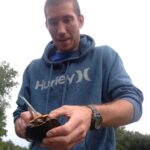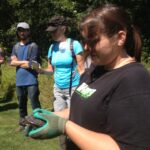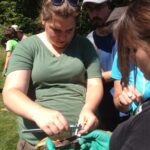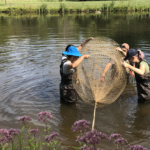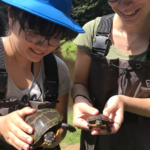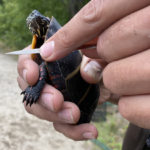Contact: David Bowne, Elizabethtown College: bowned@etown.edu; 717-361-1317
Initiated: 2011
Project Status: Completed. Not currently accepting participants.
Description
In the TurtlePop project, members of EREN conduct turtle sampling in lentic habitats on or near campus to determine the population structure of turtles across an urbanization gradient.
Worldwide, roughly 45% of freshwater turtle taxa were listed as threatened in the 2000 IUCN Red List of Threatened Species. By better understanding how common freshwater turtles respond to changes along an urbanization gradient, one can devise improved conservation strategies for the many imperiled freshwater turtle species. Researchers find skewed age and sex ratios in freshwater turtle populations and these findings are often attributed to anthropogenic changes in the landscape. A high concentration of roads near turtle nesting sites may, for example, selectively increase mortality of adult females, leading to a male-skewed population. Increased predation of nests due to a high density of predators in human-dominated landscapes (e.g. raccoons, opossums) may reduce juvenile recruitment and cause an adult-skewed population. At the time of TurtlePop’s inception, these statements had not been rigorously tested due in part to the spatial restrictions of the existing studies.
Hypotheses/Objectives: The turtles studied in this project may serve as model species for the conservation of other freshwater turtles. TurtlePop was designed to test the following primary hypotheses.
- The secondary sex ratio of turtles will be more male-biased as urbanization increases. Urbanization will be measured by road density, human population density, and habitat types within an area scaled to the movement range of the turtle species.
- The population age distribution will be more biased towards adults as urbanization increases.
Summary of Methods: Collaborators surveyed turtle populations in lentic habitats on or near their campuses following a standard trapping protocol (TurtlePop Protocol) – updated link coming soon.
Expanded project info: None.
Curriculum: To incorporate this project’s protocol and instructional materials into your college classes, review the TurtlePop Curriculum (2012)
Other Project Materials:
- Map of the Participating Institutions
- EREN Turtlepop Facebook Page
- TurtlePop Poster at the Ecological Society of America Meetings 2013
Publications:
Bowne et al. (2018) Effects of urbanization on the population structure of freshwater turtles across the United States. Conservation Biology, 32(5): 1150-1161. https://doi.org/10.1111/cobi.13136


